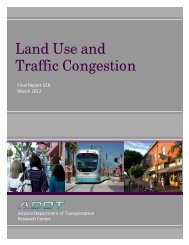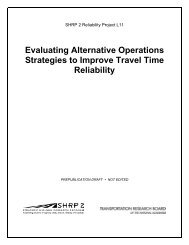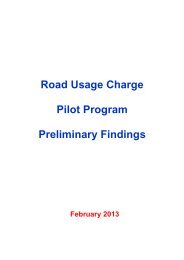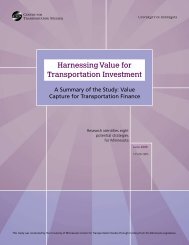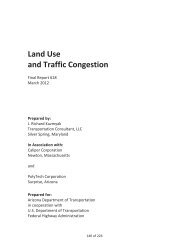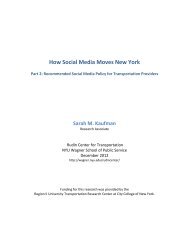Annotated Bibliography - SSTI
Annotated Bibliography - SSTI
Annotated Bibliography - SSTI
You also want an ePaper? Increase the reach of your titles
YUMPU automatically turns print PDFs into web optimized ePapers that Google loves.
Title<br />
Authors<br />
Sponsor<br />
History and Application of Least Cost Planning for Transportation from the Mid‐1990s<br />
CH2MHill and HDR<br />
Oregon DOT<br />
Date July, 2010<br />
Pages 136<br />
Category<br />
Note<br />
Online<br />
Summary<br />
Least Cost Planning (LCP), BCA, Modes: All<br />
See ODOT website for numerous articles on LCP and related analyses:<br />
http://www.oregon.gov/ODOT/TD/TP/LCP.shtml<br />
http://www.oregon.gov/ODOT/TD/TP/docs/lcp/history.pdf<br />
The report provides a history of Least Cost Planning (LCP) and related analyses in<br />
Oregon, as well as nationally and internationally. The use of LCP is described in 4 case<br />
studies, including detailed descriptions of technical approaches. For example, the report<br />
describes the application of LCP principles and methodology for the Puget Sound<br />
Region's 2040 Long Range Transportation Plan. The LCP analysis allowed decision<br />
makers to better understand trade‐offs between 7 alternative scenarios by identifying<br />
the net value associated with each scenario. This net value quantifies and monetizes the<br />
soft and hard costs associated with each scenario emphasizing different modes and<br />
policies.<br />
The report provides extensive bibliography in format similar to this document and<br />
establishes 7 principles for transportation planning to be consistent with LCP.<br />
1) The evaluation framework rolls up multiple goals.<br />
2) The range of Oregon‐specific transportation policy goals and objectives can be<br />
addressed.<br />
3) A broad range of possible multi‐modal capacity, demand‐management, land‐use,<br />
maintenance, and other planning options can be considered.<br />
4) Members of the community and decision makers are engaged in the planning and<br />
decision‐making process.<br />
5) The approach facilitates the adoption of a meaningful, relevant and operationally<br />
useful basis for choice.<br />
6) The methodology can be applied at the project‐specific level, and the collective<br />
(multi‐project) level.<br />
7) The approach has been used for transportation planning.<br />
<strong>Annotated</strong> <strong>Bibliography</strong> Page 10






